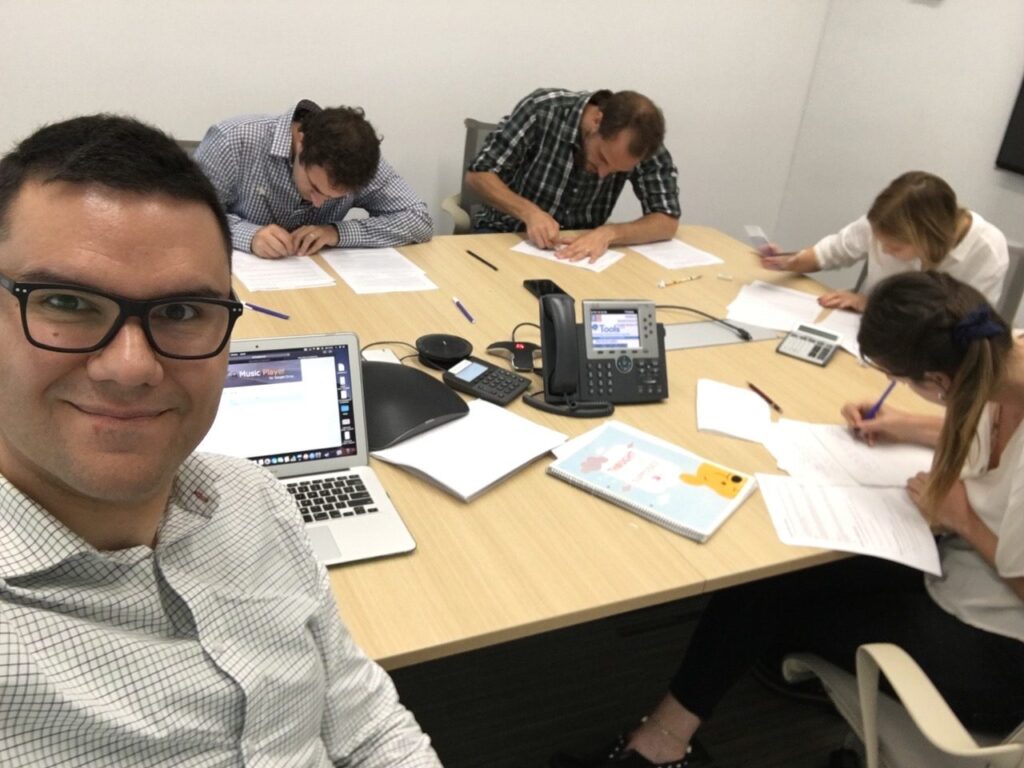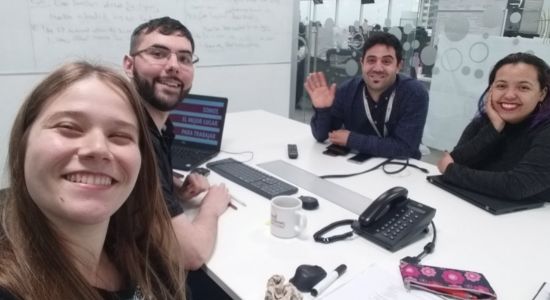In this rapidly changing world, Business English teachers are tasked with delivering language and skills that will increase students’ employability and effectiveness in the modern workplace. Teaching Business English extends beyond getting students to master corporate vocabulary and craft the perfect email. Students are best prepared when teachers emphasize integrating 21st-century skills into Business English classrooms.
New to Business English teaching? Earn Specialized Certification in Teaching Business English to learn effective tools and techniques for teaching adult professionals.
What are 21st-century skills?
The umbrella term “21st-century skills” is comprised of learning, literacy, and life skills that one needs to be a contributing member of society in the modern world. These skills are also referred to as transferable skills or soft skills. There are so many ways to bring the 21st century into your classroom. If you need ideas, upskilling with Micro-credentials is a great way to brush up on new and exciting techniques.
Learning skills: The Four Cs
While the focus of teaching Business English is to prepare learners for their future professions or support them in their current roles with language and communication skills, augmenting students’ learning with the four Cs will serve them well in the classroom, professionally, and personally.
The first C stands for Critical Thinking and encourages individuals to be more keen observers of the world around them. Instead of accepting all at face value, individuals need to develop critical thinking skills to recognize nuance and seek a deeper understanding of their environment. This starts with asking effective questions.
The second C stands for Creativity and encourages individuals to ask how something (a phenomenon or a challenge) could be understood in different terms. Using some skills similar to critical thinking, individuals using creative thinking will engage with new and preexisting knowledge to consider questions like: How could something be perceived differently if viewed through a distinct lens? How might an action be performed differently that might lead to a different outcome?
The third C is for Collaboration. In life, and more specifically in the workplace, working with others is inevitable and is of critical importance. While you might try to do it all, sooner or later you’ll come to realize that no one can be good at everything. Individuals who develop collaborative, interpersonal skills will learn to recognize others’ strengths and be able to join forces to reach a common goal.
The fourth C stands for Communication. To be successful in the workplace and life, one needs to be an effective communicator. Effective communication requires a great deal of self-awareness, which is the ability to recognize one’s tendencies in communicative exchanges.
Modernize your teaching skills to prepare learners for the future with
Micro-credentials in 21st-Century Teaching Skills
Get CertifiedLiteracy skills
Literacy in the 21st century requires more than simply decoding written language for the sake of comprehension. Individuals need to be capable of deciphering information that is presented to them, critical of the media used to deliver said information, and effective users of the technology that facilitates these exchanges.
In the digital era, there’s access to more information than ever before. Information literacy asks individuals to critically examine and interpret the data put in front of them, including contextual information and its implications.
To be literate in the 21st century means being able to decipher the constant barrage of input you receive through various forms of media. Digital literacy means that students examine all forms of media through a critical lens. Often, this begins with reading between the lines: How do I know that this source is credible? What biases are present in the information being presented? What is being omitted from the narrative, and what might the reasoning behind that be? Another component of media literacy is the recognition that there is great power and responsibility that comes with the use of different forms of media. Ultimately, you need to teach your students to be more critical consumers and producers of media.
The ubiquity of technology in the 21st century necessitates technological proficiency or technology literacy. Individuals are tasked with examining how particular forms of technology function, and to what end. How might its efficiency be increased? What limitations does it demonstrate? How might one use this technology more effectively?
Learn more about how technology is revolutionizing English language teaching.
Life skills
Working with workforce-age learners means that your students are coming to your classroom with a wealth of life experience, knowledge, and skill sets. Some life skills that have become especially important in the 21st century include flexibility, leadership, initiative, and productivity. Social skills, including empathy and the ability to communicate across cultures, have also become increasingly crucial in this globalized world.
Teaching adult professionals? Learn about the value of developing teamwork and social skills in your Business English students as well as tips to promote these skills in the classroom.

How do you integrate 21st-century skills into your Business English lessons?
Integrating 21st-century skills into your Business English lessons might sound like a daunting task, one that requires a great deal of extra time and energy, but it doesn’t have to be, with a little reverse engineering.
Begin with your context: What are the needs of your students? Where in the world are they going to be entering the workforce? What kinds of jobs are they going to be seeking? What is going to be expected of them in their roles?
Only once you have defined the requirements of your group with a needs assessment should you move on to the lesson objectives. What is it that you are trying to get your students to do in this session? Which 21st-century skills are already present in your activities?
Learn how to fast-track learning with the GSE in Business English Teaching.
Case studies: examine and resolve
Case studies are certainly championed as a learning tool in Business English settings, and rightfully so, as they provide fertile ground for examining a myriad of challenges students can expect to face in the workforce. Often, though, students are asked to examine a case study and discuss what happened, and that’s where the conversation ends. Instead of merely acknowledging challenges present in the case study, allow students to try to understand the root of the issue (Why did this happen?) and propose potential solutions (How could this issue be resolved?). In extending the dialogue, you are engaging students in critical thinking processes, initiative-taking, and collaborative problem-solving.
Audience-assisted role play
Incorporating role-play activities into a Business English classroom could be an extension of the aforementioned case studies or stand alone as an opportunity to give students a feel for real-life challenges that they might expect to encounter in the workplace. You could have students design role-play scenarios around themes that have been discussed, which serves a dual purpose: checking comprehension and highlighting critical connections between course themes and future exchanges.
Instead of treating each role-play as a performance, create a structure that requires the audience to engage. Have students work on creating questions around what is being acted out, diving deeper into contextual implications or rationale behind demonstrated behavior. Create an interactive “choose your own adventure” role-play experience, where the audience members dictate contributing factors within the scenario, requiring acting students to think on their feet and adjust their behavior according to the audience’s contributions. Nailing the performance and seeing learning put into practice will be a surefire way to boost learners’ confidence in their new skills.

Guest speaker series (real or imagined)
Bringing in experts from the field not only provides students with a chance to engage with industry leaders and gain more subject-specific exposure, but it also allows them to hear different forms of English and hone their listening skills. Of course, resources and time constraints might prevent you from physically inviting guests to your classroom, but you can get creative. Get volunteers to join your class via Zoom or asynchronously, having your students read biographies about the speaker and contribute questions to a discussion board before the session. Create a TED Talk speaker series with curated videos related to the fields your students are in or going into, and have them imagine that they are going to interview these individuals. What might they ask their role models if they had the chance?
Create ample opportunity for collaboration
Even if you are working with individuals who plan to go into fields that necessitate autonomy in roles (like software development or accountancy), there will undoubtedly be occasions during which individuals are expected to cooperate with others. Generally speaking, group work will help students build their collaborative skill set. Amp up commonplace groupwork by infusing other relevant content, specifically content that emphasizes the Four Cs (critical thinking, creativity, collaboration, and communication) and conflict resolution. Consider using games for teaching Business English to facilitate group interactions.
Build in elements of intercultural communicative competence
Living and working in the 21st century means existing in a globalized world. Not only are English learners expected to effectively communicate in their target language, but they’re also asked to do so in culturally-novel environments. How can you prepare them to get past the culture shock that inevitably arises in an intercultural workplace? How can you increase learners’ ability to empathize with individuals from different backgrounds? By teaching English as a global language, you can expose students to different accents, dialects, and cultures. Consider including narratives that differ from the lived experiences of the students present. Offer opportunities for students to reflect on how their cultural background and identity might inform how they engage with others through reflective journaling and guided storytelling.
Raise your level of professionalism with
Specialized Certification in Teaching Business English
Get CertifiedGet students comfortable with talking about their 21st-century skills
While honing students’ 21st-century skills is critical and the primary goal, simply having these skills alone will not increase the students’ employability. Students need to be able to talk about their abilities to get the job! Give students a chance to practice talking about their skill sets in mock interviews.
In this day and age, a Business English classroom demands hybrid instruction, expanding not only students’ language abilities but also increasing their employability through the development of 21st-century skills. But perhaps even more importantly, Business English, when done well, produces not just competent workers but more well-rounded human beings.










